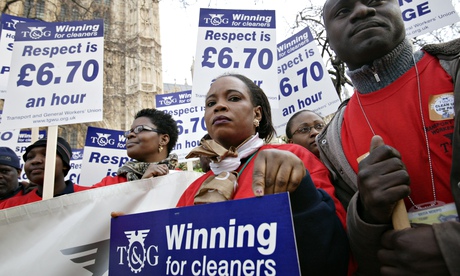Only one in four workers who were low-paid in 2001 managed to move on to higher pay after a decade, says social mobility study.
The extent to which low-paid workers in the UK stay trapped in poverty is highlighted by a report showing only one in four workers who were low-paid in 2001 – and who have remained in employment for most of the subsequent decade – went on to escape poverty and move on to higher pay.
The findings come in a report by the Resolution Foundation thinktank, requested by the government commission on social mobility.
The report finds that among the three-quarters of workers who were low-paid a decade ago, the majority cycled between low and higher pay over the course of the decade. Just 12% of those who stayed in employment were stuck in low pay every year of that decade.

The value of escaping low pay can be considerable, the report finds. The “escapers” saw their wages grow by an average 7.5% in real terms over the course of a decade, bringing their pay to around the level of typical workers. Those unable to escape low pay saw their wages grow half as fast (at 3.6% a year in real terms).
Key characteristics of escapers include having or obtaining a degree, possessing a positive outlook for the future and working for a large employer (defined as a company with 1,000-plus employees).
A key barrier to pay progression appears to be working part-time, alongside other factors such as being older, a single parent or disabled.
Workers also tend to stay on low pay if they are in specific industries, such as sales or hospitality. Fewer than one in five workers in the hospitality sector manage any serious pay progression.
The report looks at workers who were low paid in 2001, and who were in work for the majority of the subsequent decade, with at least three of those years being consecutive. An employee is judged to have escaped low pay if they were low paid in 2001 and moved on to wages above low pay in the final three years of the decade. Those who are stuck in low pay are defined as employees who were low paid in 2001 and have worked for the majority of the subsequent decade, but who have earned below the low-pay threshold in every year they have worked. The low-pay threshold is defined as two-thirds of median hourly earnings. In 2013, the threshold was £7.69.
Vidhya Alakeson, the deputy chief executive at the Resolution Foundation, said: “Britain has a long-standing low-pay problem, with over a fifth of the workforce in poorly paid jobs. But the limited opportunities for escaping low pay is just as big a concern as it has huge consequences for people’s life chances.”
Alan Milburn, the chair of the Social Mobility and Child Poverty Commission, said: “The majority of Britain’s poorest paid workers never escape the low-pay trap. Too many simply cycle in and out of low-paying jobs instead of being able to move up the pay ladder. Any sort of work is better than no work but being in a job does not guarantee a route out of poverty.
“This research provides compelling evidence for employers and government to do more on pay progression. It is a powerful argument for Britain to become a ‘living wage’ country.”
The CBI annual conference in London this week highlighted the squeeze on living standards and called for government measures to help the poorest in work, including cutting national insurance costs and helping potential workers who have very young children.
In a significant shift on Monday, Britain’s bosses called for action to tackle the living standards crisis, by lifting the lowest paid out of national insurance and expanding free childcare. The CBI also discussed what business could do to tackle low pay.
Sir Michael Rake, the CBI president, said: “Falling real wages – a price worth paying to preserve jobs during and after the recession – cannot go on for much longer. For those currently in low-paying jobs or trying for entry-level roles, business has to do much more to help them climb the ladder and progress. We want to see the benefits of a growing economy translated into better opportunities for all people.”
Nick Clegg, the deputy prime minister, told the CBI he thought the squeeze on living standards was a lagging indicator and would end soon. He said persistent low productivity in the UK was a puzzle and one reason for the slow rise in earnings may be due to the number of relatively low-paid young workers joining the employment market.